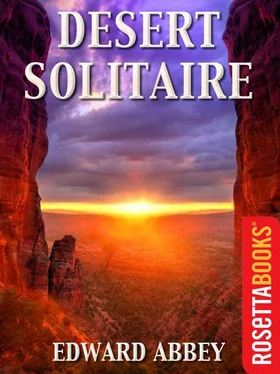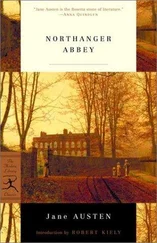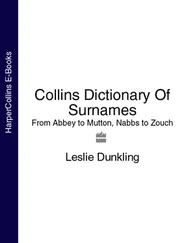Abbey, Edward - Desert Solitaire (Edward Abbey Series )
Здесь есть возможность читать онлайн «Abbey, Edward - Desert Solitaire (Edward Abbey Series )» — ознакомительный отрывок электронной книги совершенно бесплатно, а после прочтения отрывка купить полную версию. В некоторых случаях можно слушать аудио, скачать через торрент в формате fb2 и присутствует краткое содержание. Год выпуска: 2011, Издательство: RosettaBooks, Жанр: Старинная литература, на английском языке. Описание произведения, (предисловие) а так же отзывы посетителей доступны на портале библиотеки ЛибКат.
- Название:Desert Solitaire (Edward Abbey Series )
- Автор:
- Издательство:RosettaBooks
- Жанр:
- Год:2011
- ISBN:нет данных
- Рейтинг книги:4 / 5. Голосов: 1
-
Избранное:Добавить в избранное
- Отзывы:
-
Ваша оценка:
- 80
- 1
- 2
- 3
- 4
- 5
Desert Solitaire (Edward Abbey Series ): краткое содержание, описание и аннотация
Предлагаем к чтению аннотацию, описание, краткое содержание или предисловие (зависит от того, что написал сам автор книги «Desert Solitaire (Edward Abbey Series )»). Если вы не нашли необходимую информацию о книге — напишите в комментариях, мы постараемся отыскать её.
Desert Solitaire (Edward Abbey Series ) — читать онлайн ознакомительный отрывок
Ниже представлен текст книги, разбитый по страницам. Система сохранения места последней прочитанной страницы, позволяет с удобством читать онлайн бесплатно книгу «Desert Solitaire (Edward Abbey Series )», без необходимости каждый раз заново искать на чём Вы остановились. Поставьте закладку, и сможете в любой момент перейти на страницу, на которой закончили чтение.
Интервал:
Закладка:
As predicted, the snowfall has disappeared by this time and all watercourses in the park are dry except for the one spring-fed perennial stream known as Salt Creek, a glassy flow inches deep that trickles over shoals of quicksand and between mud flats covered with white crusts of alkali. Though it looks potable the water is too saline for human consumption; horses and cattle can drink it but not men. Or so I am informed by Merle and Floyd. I choose to test their belief by experiment. Squatting on the shore of the stream, I dip my cupped hands into the water and sample a little. Pretty bad, neither potable nor palatable. Perhaps, I suggest, a man could learn to drink this water by taking only a little each day, gradually increasing the dosage…?
“You try that,” says Merle.
“Yeah,” Floyd says, “give us a report at the end of the summer.”
Late this afternoon we return to the housetrailer. Floyd lends me a park ranger shirt which he says he doesn’t need anymore and which I am to wear in lieu of a uniform, so as to give me an official sort of aspect when meeting the tourists. Then there’s this silver badge I’m supposed to pin to the shirt. The badge gives me the authority to arrest malefactors and evildoers, Floyd explains. Or anyone at all, for that matter.
I place both Floyd and Merle under arrest at once, urging them to stay and have supper with me. I’ve got a big pot of pinto beans simmering on the stove. But they won’t stay, they have promises to keep and must leave, and soon they’re driving off in the water-truck over the rocky road to the highway and Moab. Climbing the rise behind the housetrailer I watch them go, the truck visible for a mile or so before the road winds deeper into the complex of sand dunes, corraded monoliths and hogback ridges to the west.
Beyond the highway, about ten miles away, rise the talus slopes and vertical red walls of Dead Horse Mesa, a flat-topped uninhabited island in the sky which extends for thirty miles north and south between the convergent canyons of the Green and Colorado rivers. Public domain. Above the mesa the sun hangs behind streaks and streamers of wind-whipped clouds. More storms coming.
But for the time being, around my place at least, the air is untroubled, and I become aware for the first time today of the immense silence in which I am lost. Not a silence so much as a great stillness—for there are a few sounds: the creak of some bird in a juniper tree, an eddy of wind which passes and fades like a sigh, the ticking of the watch on my wrist—slight noises which break the sensation of absolute silence but at the same time exaggerate my sense of the surrounding, overwhelming peace. A suspension of time, a continuous present. If I look at the small device strapped to my wrist the numbers, even the sweeping second hand, seem meaningless, almost ridiculous. No travelers, no campers, no wanderers have come to this part of the desert today and for a few moments I feel and realize that I am very much alone.
There is nothing to do but return to the trailer, open a can of beer, eat my supper.
Afterwards I put on hat and coat and go outside again, sit on the table, and watch the sky and the desert dissolve slowly into mystery under the chemistry of twilight. We need a fire. I range around the trailer, pick up some dead sticks from under the junipers and build a little squaw fire, for company.
Dark clouds sailing overhead across the fields of the stars. Stars which are unusually bold and close, with an icy glitter in their light—glints of blue, emerald, gold. Out there, spread before me to the south, east, and north, the arches and cliffs and pinnacles and balanced rocks of sandstone (now entrusted to my care) have lost the rosy glow of sunset and become soft, intangible, in unnamed unnamable shades of violet, colors that seem to radiate from—not overlay—their surfaces.
A yellow planet floats on the west, brightest object in the sky. Venus. I listen closely for the call of an owl, a dove, a nighthawk, but can hear only the crackle of my fire, a breath of wind.
The fire. The odor of burning juniper is the sweetest fragrance on the face of the earth, in my honest judgment; I doubt if all the smoking censers of Dante’s paradise could equal it. One breath of juniper smoke, like the perfume of sagebrush after rain, evokes in magical catalysis, like certain music, the space and light and clarity and piercing strangeness of the American West. Long may it burn.
The little fire wavers, flickers, begins to die. I break another branch of juniper over my knee and add the fragments to the heap of coals. A wisp of bluish smoke goes up and the wood, arid as the rock from which it came, blossoms out in fire.
Go thou my incense upward from this hearth
And ask the gods to pardon this clear flame.
I wait and watch, guarding the desert, the arches, the sand and barren rock, the isolated junipers and scattered clumps of sage surrounding me in stillness and simplicity under the starlight.
Again the fire begins to fail. Letting it die, I take my walking stick and go for a stroll down the road into the thickening darkness. I have a flashlight with me but will not use it unless I hear some sign of animal life worthy of investigation. The flashlight, or electrical torch as the English call it, is a useful instrument in certain situations but I can see the road well enough without it. Better, in fact.
There’s another disadvantage to the use of the flashlight: like many other mechanical gadgets it tends to separate a man from the world around him. If I switch it on my eyes adapt to it and I can see only the small pool of light which it makes in front of me; I am isolated. Leaving the flashlight in my pocket where it belongs, I remain a part of the environment I walk through and my vision though limited has no sharp or definite boundary.
This peculiar limitation of the machine becomes doubly apparent when I return to the housetrailer. I’ve decided to write a letter (to myself) before going to bed, and rather than use a candle for light I’m going to crank up the old generator. The generator is a small four-cylinder gasoline engine mounted on a wooden block not far from the trailer. Much too close, I’d say. I open the switch, adjust the choke, engage the crank and heave it around. The engine sputters, gasps, catches fire, gains momentum, winds up into a roar, valves popping, rockers thumping, pistons hissing up and down inside their oiled jackets. Fine: power surges into the wiring, the light bulbs inside the trailer begin to glow, brighten, becoming incandescent. The lights are so bright I can’t see a thing and have to shade my eyes as I stumble toward the open door of the trailer. Nor can I hear anything but the clatter of the generator. I am shut off from the natural world and sealed up, encapsulated, in a box of artificial light and tyrannical noise.
Once inside the trailer my senses adjust to the new situation and soon enough, writing the letter, I lose awareness of the lights and the whine of the motor. But I have cut myself off completely from the greater world which surrounds the man-made shell. The desert and the night are pushed back—I can no longer participate in them or observe; I have exchanged a great and unbounded world for a small, comparatively meager one. By choice, certainly; the exchange is temporarily convenient and can be reversed whenever I wish.
Finishing the letter I go outside and close the switch on the generator. The light bulbs dim and disappear, the furious gnashing of pistons whimpers to a halt. Standing by the inert and helpless engine, I hear its last vibrations die like ripples on a pool somewhere far out on the tranquil sea of desert, somewhere beyond Delicate Arch, beyond the Yellow Cat badlands, beyond the shadow line.
I wait. Now the night flows back, the mighty stillness embraces and includes me; I can see the stars again and the world of starlight. I am twenty miles or more from the nearest fellow human, but instead of loneliness I feel loveliness. Loveliness and a quiet exultation.
Читать дальшеИнтервал:
Закладка:
Похожие книги на «Desert Solitaire (Edward Abbey Series )»
Представляем Вашему вниманию похожие книги на «Desert Solitaire (Edward Abbey Series )» списком для выбора. Мы отобрали схожую по названию и смыслу литературу в надежде предоставить читателям больше вариантов отыскать новые, интересные, ещё непрочитанные произведения.
Обсуждение, отзывы о книге «Desert Solitaire (Edward Abbey Series )» и просто собственные мнения читателей. Оставьте ваши комментарии, напишите, что Вы думаете о произведении, его смысле или главных героях. Укажите что конкретно понравилось, а что нет, и почему Вы так считаете.












